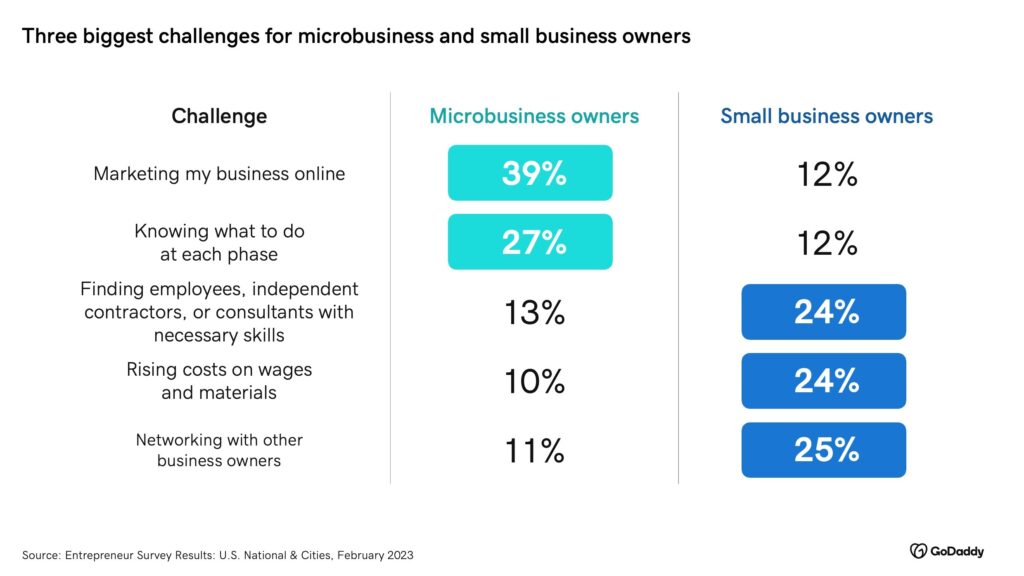
New data suggests microbusinesses face different top challenges than small businesses
Data Forward
New data suggests microbusinesses face different top challenges than small businesses

The Big Fact: Microbusiness owners struggle or experience more challenges marketing their business online and knowing what to do at each phase of the business compared to small business owners, according to GoDaddy’s Venture Forward research initiative. By contrast, small business owners experience bigger challenges finding workers with necessary skills, tackling rising costs on wages and materials, and networking with other business owners.
While expanding a venture from microbusiness to small business comes with inherent growing pains, ensuring that microbusiness have the resources they need to get started is essential to their success.

Motivational differences: Microbusiness and small business owners listed very different reasons for starting a business.
For Microbusiness owners, this includes the desire to:
- Be their own boss (43%).
- Support a cause or hobby they are passionate about (32%).
- Have the flexibility a traditional job couldn’t provide (30%).
By contrast, small business owners who participated in GoDaddy’s American Dream survey listed their top reasons for starting a business as the desire to:
- Make extra money (49%).
- Stay active while being retired (40%).
- Achieve a dream they’ve always had of starting a business (33%).
And while the majority of American small business owners believe that being a successful entrepreneur is a key way to create new generational wealth (78%), many maintain modest business aspirations, such as wanting to either stay a ‘solo entrepreneur’ (28%) or remain a small business but with some employees and perhaps a physical location (35%). Only 12% aspire to one day become a corporate business with a large employee base and headquarters.
The research: GoDaddy’s Venture Forward research initiative analyzes more than 20 million online businesses with a digital presence (measured by a unique domain and an active website). Most of these businesses employ fewer than ten people, categorizing each as a microbusiness. While these microbusinesses may be small, their impact on economies is outsized even though they are often too informal or too new to show up in traditional government statistics.
Since 2018, Venture Forward surveyed more than 36,000 small business owners with a digital presence, making it the source for microbusiness data and insights.
More Stories & Use Cases

Four policy pillars that will encourage online microbusinesses
To support a vibrant part of the economy, focus on access to capital, broadband, benefits and marketing skills
Read the article entitled “Four policy pillars that will encourage online microbusinesses”
America’s digital divide is hindering economic growth
Larry Irving, a former federal telecommunications official, explains what policymakers can do right now to support micro businesses in at-risk communities
Read the article entitled “America’s digital divide is hindering economic growth”
How historic Denison, Texas, went digital to “thrive, not just survive” in the COVID era
Constant support and e-commerce grants help brick-and-mortar businesses adapt
Read the article entitled “How historic Denison, Texas, went digital to “thrive, not just survive” in the COVID era”
What it means to be an entrepreneur in an underserved community in America
Access to opportunity isn't created equal. These stories of perseverance will inspire anyone
Read the article entitled “What it means to be an entrepreneur in an underserved community in America”